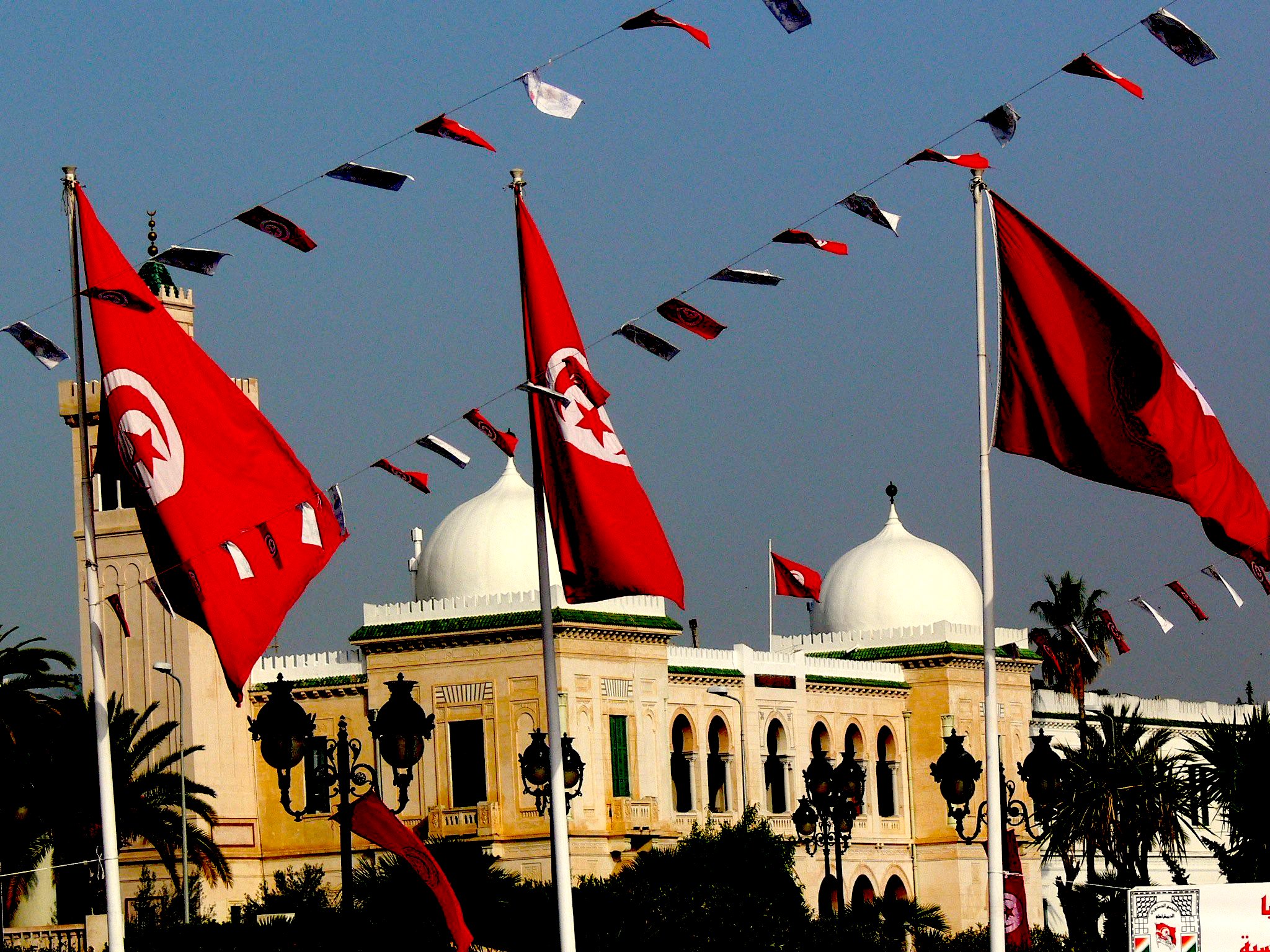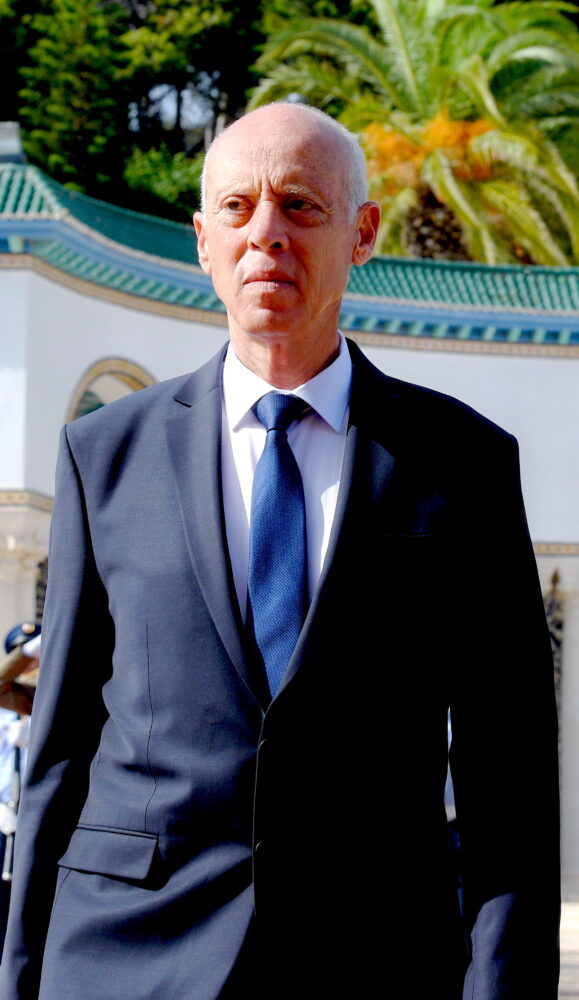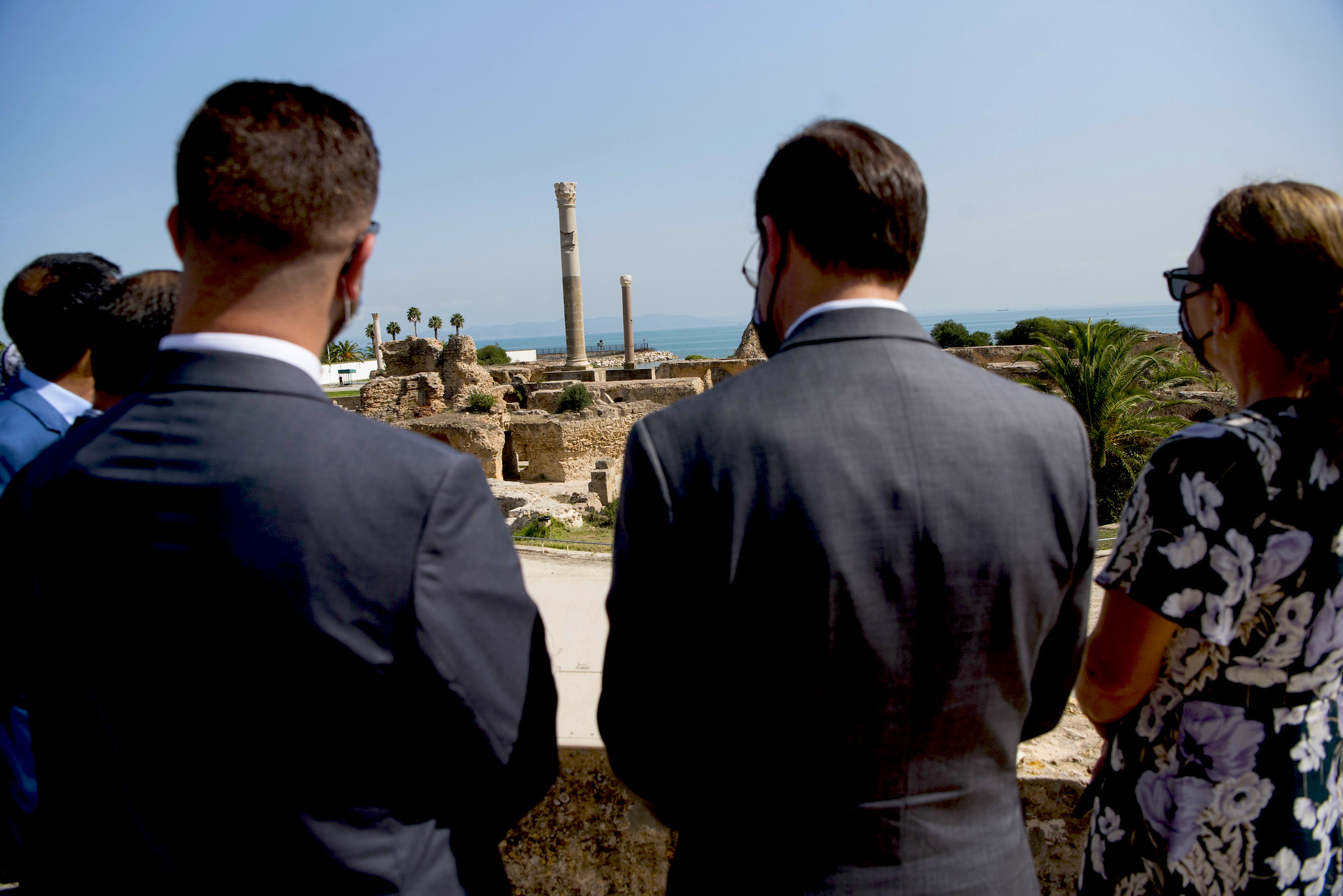As`ad AbuKhalil says a true Arab democracy would restrain U.S. influence and criminalize normalization with Israel.

Government buildings in Tunis, the capital city of Tunisia. (Cernavoda, Flickr, CC BY-SA 2.0)
By As`ad AbuKhalil
Special to Consortium News
 Tunisia’s president is designing his own republic according to his own interests and whims.
Tunisia’s president is designing his own republic according to his own interests and whims.
Kais Saied was hardly known outside of Tunisia before his election in 2019 and Tunisians had known him only as a constitutional professor who commented on political matters on television. He did not speak like an average politician; for one, he spoke classical Arabic and in a wooden manner (he is articulate in Arabic but not eloquent).
He came across as an honest man without any political baggage and was not beholden to any local or regional interests. His staple when he ran for office in 2019 was his stern answer to questions about normalization with Israel. He would often be asked about it and would refreshingly speak in blunt language little known in a region where leaders are too afraid to offend the U.S. and the Israeli lobby.
Saied’s answer about normalization was a hit among Tunisians: he pledged he would criminalize normalization with Israel and that the Zionist entity should not be recognized. He talked of the expulsion of Palestinians from their homeland. That kind of language had been standard for much of contemporary Arab history until the new millennium when Saudi Arabia — under U.S. auspices — introduced the 2002 “Arab peace initiative.”
That pledged Arab normalization with Israel in return for the establishment of a Palestinian state in the West Bank and Gaza. (Israel is still studying the Arab offer and the U.S. recommends that Israel takes its time in studying it). Saied went as far as to call normalization with Israel treason. His pledge on Palestine was instrumental in his rise during the presidential election.
He railed against various threats and even condemned homosexuality, which he linked to foreign conspiracies. He was not progressive on gender issues and supported the inequity of inheritance in accordance with religious law. He proposed a new political system and offered his candidacy as an alternative to the tired-out political parties.
Secular Elites

Kaïs Saïed arriving as president at Palace of Carthage in October 2019. (Houcemmzoughi, CC BY-SA 4.0, Wikimedia Commons)
Saied attracted the secular elite of Tunisia: people who are distrustful of the Islamists and who — instead of electoral competition — wanted a strongman (not a strong woman) to take out the Islamist threat. Arab secularists are disillusioned with the Arab masses and their electoral choices and tend to favor military and autocratic rulers who can suppress Islamists. Egyptian dictator Abdul-Fattah Al-Sisi can’t govern without the support of the cultural, political and artistic elite who complain about the culture Islamists would bring. Arab secularists are now the main vehicle for autocratic war on Islamists.
Tunisia’s social fabric is different from that of most Arab countries: it has a sizable middle class and strong civil society. (Civil society in Tunisia — unlike in other Arab countries, including Lebanon and Palestine — is not confined to Western-funded NGOs, but includes progressive labor unions and civic associations like the Tunisian Association of Constitutional Law, which Saied headed before assuming the presidency).
As soon as Saied took office, it was clear that there were two centers of power competing in Tunisia: one resided with the parliament, which was controlled by EnNahda political party (the local branch of the Muslim Brotherhood) headed by Rashid Ghannoushi; and the other power was represented by the president himself, who has secular — partly secular to be exact — inclinations. Saied was aided in his power by jockeying with the U.S.-affiliated Tunisian armed forces. The armed forces are trained (by the U.S.) to fight Islamists and rebels, not to defend the border from foreign threats.
By July 2021, Saied had suspended parliament in the wake of anti-government demonstrations. He was fed up and wanted to rule by decree. He was gradual in his extra-constitutional coup because he wanted to examine foreign reactions. Naturally, Gulf regimes (which had not been pleased with his firm stance against normalization with Israel) quickly expressed support and sympathy because he was undermining the power of Islamists, who they view (outside of Qatar) as their mortal enemy, second only to Iran.
Tolerance of Repression

Sept. 30, 2020: Then U.S. Defense Secretary Mark Esper visits Antonine Baths ruins, Carthage, Tunisia. (DoD, Lisa Ferdinando)
Western powers had similar reactions as well; to be sure, there were lame statements about the need to respect the democratic process and that the Tunisian constitution should be upheld. But those are statements typically reflect American political tolerance of repression in Arab countries. Whenever there is an election in Lebanon, for instance, the U.S. and France issue statements that insist on prompt voting because they usually hope for their own clients to be elected.
In the case of Tunisia, there was significant indulgence to the coup of Saied. Western and Gulf governments find it easier — much easier — to do business with autocrats than with elected democratic leaders who need to navigate through complicated constitutional processes and pay attention to the wishes of the people. A real Arab democracy would criminalize peace and normalization with Israel, and would restrain U.S. influence.
In his state of emergency, Saied referred several politicians to courts for “electoral violations” and pledged to clear corruption from the political system. This constitutional law professor even dissolved the Supreme Judicial Council. It is now he alone who can determine the exact interpretation of the constitution. Saied was not satisfied with the current constitution, the one that ironically brought him to power. He designed his own constitution.
It was approved in a referendum on July 25 by 94.6 percent of voters, though turnout was low. The new constitution clearly recognizes the very Arabic style of the president himself, who actually wrote it himself. It takes Tunisia from a parliamentary to a presidential system. The new constitution lacks exactitude, allowing for the prolongation of the president’s term in the event of a “looming danger.” That term, (khatar dahim in Arabic) appears more than once in the new document. But who would determine whether a danger is looming — or not — other than the president? In other words, the president designed a new constitution which would allow him to violate it for what he considers a “looming danger.”
On normalization with Israel, the president reversed himself. Here is a president who actually won office on the promise of “criminalization of normalization with Israel” and now has retracted it out of fear of displeasing Western and Gulf governments. The new constitution talks about the Palestinian cause in the preamble and declares Tunisia’s support for “legitimate rights of people who are entitled, according to this [international legitimacy] to determine its own destiny and first among them is the right of the Palestinian people to its stolen land and to establish its state on it after its liberation with holy Jerusalem as its capital.”
This reference may seem impressive by Western standards but it falls short of the very promise that Saied himself had made when he ran for president. Saied made the same concession the Islamist EnNahda party made when it came to power. It had promised to criminalize normalization but their leader Ghannoushi reneged on it under U.S. pressure after he visited D.C. and spoke in a closed session at the Washington Institute for Near East Policy.
Saied is now just one among many Arab autocrats, and his hold on power is facilitated by the regional tyrannical order controlled by the U.S. and Gulf regimes. He dares not offend the Gulf monarchies and refrains from condemning the UAE alliance with Israel. His top priority is to secure a veneer of electoral legitimacy in a country with falling voter turnouts.
Yet, he remains the most popular figure in Tunisia, largely due to a lack of alternatives. Moreover, EnNahda‘s rule was not impressive from the people’s point of view. With Tunisia advancing quickly into autocracy, Lebanon remains the most open country where elections still take place, despite Western protestations at the results when Hizbullah and its allies win seats.
Saied is celebrating the approval of his constitution. Celebrations of Saied remain permissible in an increasingly repressive republic.
As`ad AbuKhalil is a Lebanese-American professor of political science at California State University, Stanislaus. He is the author of the Historical Dictionary of Lebanon (1998), Bin Laden, Islam and America’s New War on Terrorism (2002) and The Battle for Saudi Arabia (2004). He tweets as @asadabukhalil
The views expressed are solely those of the author and may or may not reflect those of Consortium News.

The problem with Autocracy is that wealth is not solely gained by personal enterprise but depends upon government to protect their wealth no matter the condition of the populace
Autocratic government does not necessarily mean poverty and tyranny over citizensns welfare, look at Saudi Arabia Royalty and its population both are well to do and other than poor females the State leaves them alone to a peacefull and prosperous lifestyle.
The US itself was formed by an Autocratic few individuals and like Saudi Arabia had a religious backing to protect them from populace uprising.
A true democracy doesn’t elect public figures in the first place, because Elections Are Not Democracy. The first step towards a real democracy is recognizing this, as the Athenians and Aristotle did, and as everyone else did throughout the ancient world up to the middle ages and renaissance until American and French Revolution figures chose to distort the word from its original meaning to become its opposite: a synonym for republican oligarchies. Arabs should be especially sensitive to this topic because it was their Muslim scholars that preserved many of Aristotle’s major works during the European dark ages by translating them into Arabic.
Could be a plant like Obama